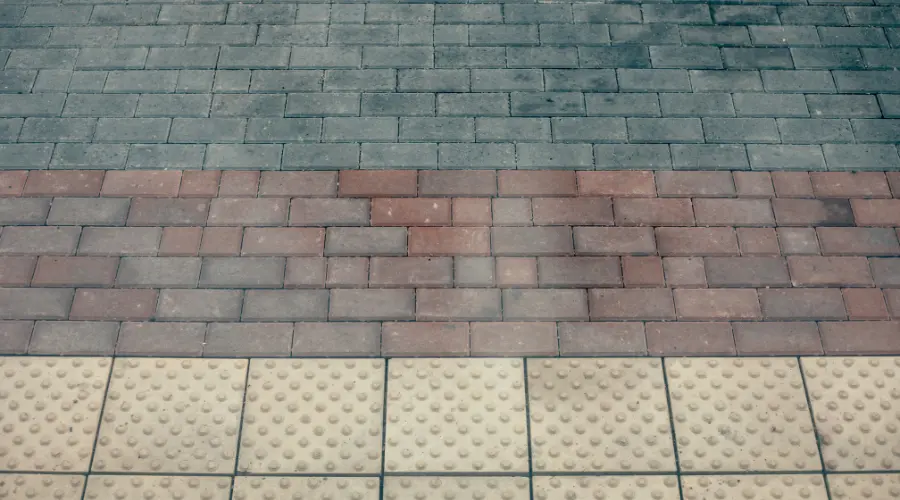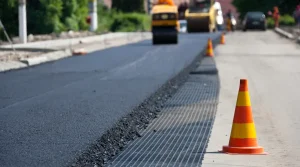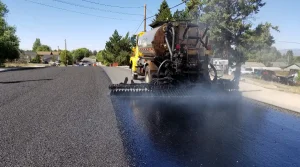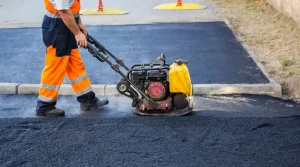Is Your Current Pavement Costing You More Than It Should?
Are you tired of constantly repairing your driveway or commercial parking lot? Do puddles form on your pavement every time it rains? Or perhaps you’re building new and feeling overwhelmed by all the pavement options available?
Choosing the right type of pavement for your property isn’t just about aesthetics—it’s an investment decision that affects maintenance costs, property value, and safety for years to come. With over 40 years of experience in the paving industry, we’ve helped thousands of New Jersey property owners select the perfect pavement solution for their specific needs and budget.
In this comprehensive guide, we’ll walk you through everything you need to know about the different types of pavement, their unique characteristics, and how to determine which is ideal for your specific project.
7 Most Common Types of Pavement for Residential and Commercial Properties
1. Asphalt Pavement (Hot Mix Asphalt)
Asphalt is perhaps the most recognizable type of pavement, covering approximately 94% of paved roads in the United States. This petroleum-based mixture combines aggregates with bitumen to create a durable, flexible surface.
Key benefits of asphalt pavement include:
- ✓ Cost-effective installation compared to concrete
- ✓ Quick installation and curing time (usually ready for use within 24-48 hours)
- ✓ Excellent durability in freeze-thaw climates like New Jersey
- ✓ Smooth, quiet driving surface
- ✓ Easy to repair and maintain with proper care
- ✓ Dark color helps snow and ice melt faster
Best applications for asphalt pavement:
- Residential driveways
- Commercial parking lots
- Roads and highways
- Walking paths and recreational areas
While asphalt typically costs less upfront than concrete, it requires more regular maintenance, including sealcoating every 2-3 years and potential resurfacing every 15-20 years depending on usage and weather conditions.
2. Concrete Pavement
Concrete pavement consists of a mixture of cement, water, sand, and aggregate. Known for its strength and longevity, concrete offers a rigid pavement solution that can last 30+ years with proper installation and maintenance.
Advantages of concrete pavement:
- ✓ Exceptional durability and compressive strength
- ✓ Minimal maintenance requirements
- ✓ Light color reflects heat (cooler in summer)
- ✓ Resistant to fuel and oil spills
- ✓ Can be stamped or colored for decorative applications
- ✓ Higher load-bearing capacity than asphalt
Common concrete pavement applications:
- Sidewalks and patios
- Driveways for luxury homes
- Commercial entryways
- Industrial loading areas
- Heavy-traffic commercial properties
The higher initial investment for concrete pavement is often offset by its longer lifespan and reduced maintenance costs compared to asphalt. However, concrete can crack in freeze-thaw cycles if not properly installed with adequate drainage and expansion joints.
3. Permeable Pavement
As environmental concerns grow and stormwater management regulations tighten, permeable pavement has gained popularity as a sustainable alternative to traditional impervious surfaces.
Benefits of permeable pavement:
- ✓ Reduces runoff and prevents pooling water
- ✓ Filters pollutants before they enter groundwater
- ✓ Reduces the need for separate drainage systems
- ✓ May qualify for LEED certification points
- ✓ Can help meet local stormwater management requirements
- ✓ Available in various materials including asphalt, concrete, and pavers
Ideal applications for permeable pavement:
- Low-traffic parking areas
- Residential driveways in flood-prone areas
- Walkways and patios
- Commercial properties with stormwater management concerns
While initially more expensive than traditional pavement, permeable surfaces can significantly reduce or eliminate the need for expensive stormwater management systems, potentially saving money over the long term.
4. Brick and Concrete Pavers
Pavers offer unmatched aesthetic versatility, available in countless shapes, sizes, colors, and textures. Beyond their visual appeal, pavers provide practical benefits that make them ideal for specific applications.
Why choose pavers:
- ✓ Superior aesthetic appeal and customization options
- ✓ Individual units can be replaced if damaged
- ✓ Excellent durability with proper installation
- ✓ Available in permeable options for drainage
- ✓ Can increase property value through curb appeal
- ✓ Withstands freeze-thaw cycles better than poured concrete
Best applications for pavers:
- Luxury home driveways
- Patios and walkways
- Pool decks
- Commercial plazas and pedestrian areas
- Decorative borders around other pavement types
While pavers typically cost more per square foot than asphalt or concrete, their segmented design allows for spot repairs rather than full replacement, potentially saving money over time.
5. Gravel and Crushed Stone
For budget-conscious property owners or those seeking a rustic aesthetic, gravel and crushed stone offer affordable and versatile pavement options.
Advantages of gravel pavement:
- ✓ Lowest initial installation cost
- ✓ Excellent drainage characteristics
- ✓ Easy DIY installation for small projects
- ✓ Various colors and sizes available
- ✓ Can be upgraded or paved over later
- ✓ Environmentally friendly option
Ideal uses for gravel pavement:
- Rural driveways and access roads
- Temporary parking areas
- Walking paths
- Garden areas and landscapes
- Budget-friendly solution for large areas
While gravel requires periodic replenishment and grading, its dramatically lower installation cost makes it an attractive option for certain applications, especially in rural settings.
6. Chip Seal Pavement
Chip seal (also called tar and chip) combines aspects of asphalt and gravel to create a unique surface that offers several distinct advantages.
Benefits of chip seal pavement:
- ✓ More affordable than asphalt but more durable than gravel
- ✓ Excellent traction in wet conditions
- ✓ Rustic, textured appearance
- ✓ Low maintenance requirements
- ✓ Can be applied over existing asphalt
- ✓ Multiple stone color options available
Common chip seal applications:
- Rural roads and driveways
- Private lanes and access roads
- Low-budget municipal road maintenance
- Surface treatment for aging asphalt pavements
Chip seal typically lasts 5-7 years before needing reapplication, making it a cost-effective intermediate solution between gravel and full asphalt pavement.
7. Stamped Asphalt
For property owners who desire the durability of asphalt with enhanced aesthetic appeal, stamped asphalt offers an innovative solution.
Why consider stamped asphalt:
- ✓ Combines the durability of asphalt with decorative patterns
- ✓ More affordable than pavers or stamped concrete
- ✓ Available in various patterns resembling brick, stone, or slate
- ✓ Can be colored to complement property aesthetics
- ✓ Adds unique curb appeal that stands out from standard pavement
- ✓ Faster installation than individual pavers
Ideal applications for stamped asphalt:
- Residential driveways
- Commercial entryways
- Crosswalks
- Decorative borders and accent areas
- Theme parks and decorative commercial spaces
How to Choose the Right Type of Pavement for Your Property
When selecting the ideal pavement for your project, consider these critical factors:
- Budget constraints (both initial installation and long-term maintenance)
- Climate conditions (freeze-thaw cycles, rainfall, temperature extremes)
- Anticipated traffic volume and vehicle types
- Aesthetic preferences and neighborhood standards
- Environmental concerns and drainage requirements
- Local building codes and HOA regulations
- Expected lifespan and future property plans
Why Professional Installation Matters More Than Pavement Type
Even the highest quality pavement materials will fail prematurely without proper installation. Professional paving contractors understand the critical importance of:
- Thorough site preparation and grading
- Proper base construction and compaction
- Adequate drainage design
- Appropriate material thickness for the application
- Professional compaction techniques
- Proper curing and finishing
Transform Your Property With Expert Paving Solutions from Hackensack Paving Company
For over four decades, Hackensack Paving Company has been northern New Jersey’s trusted paving expert, delivering exceptional results for residential and commercial properties alike. Our team of certified paving professionals can help you select the perfect pavement type for your specific needs and budget.
Ready to transform your property with beautiful, durable pavement that lasts? Contact our team today for a free, no-obligation consultation and estimate. Our paving experts will visit your property, assess your needs, and provide straightforward recommendations tailored to your specific situation.
Call (201)-514-6060 or www.pavinghackensack.com to take the first step toward beautiful, durable pavement that enhances your property’s value and curb appeal for years to come.
Hackensack Paving Company – Delivering Excellence in Every Project Since 1982







